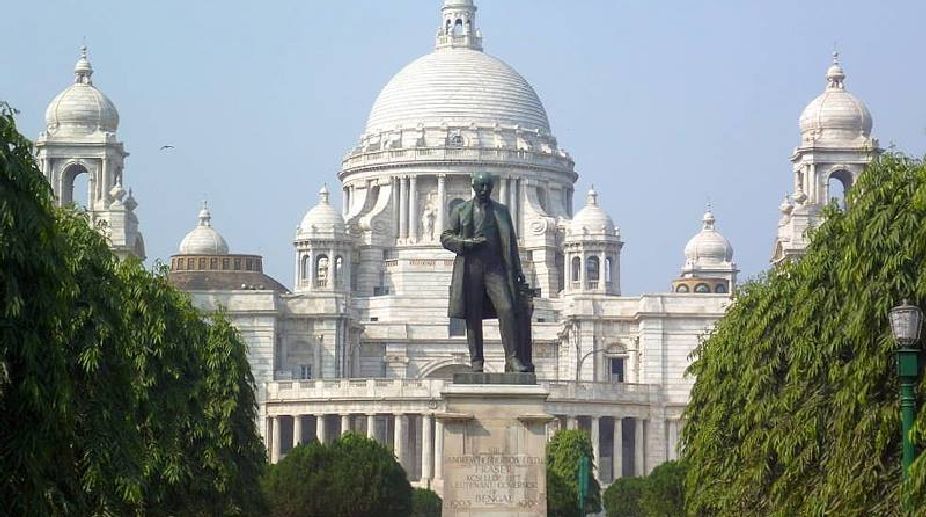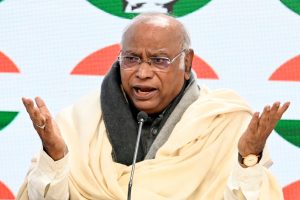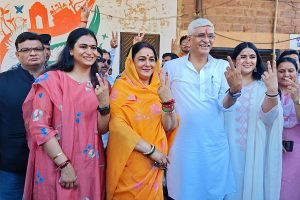Sir Andrew Henderson Leith Fraser, Lieutenant Governor of Bengal, had gone to Overtoun Hall in Calcutta on a warm July evening in 1908 to hear a lecture. He suddenly found a revolver pressed to his ribs.
The nondescript young man who had his finger on the trigger seemed determined to send him to the hereafter, as a coup against the ruthless colonial rule the Governor represented. But the revolver malfunctioned. Before the man could try again, the large American, Keith Barber, who looked after Overtoun Hall, tackled him, and the police arrived.
That wasn’t the only episode of the nationalist drama in the Overtoun Hall, the centerpiece of the large YMCA building at the corner of College Street and Harrison Road.
Keshab Chandra Sen had advocated English education there, and a decade later Gandhi spoke there on nationalism and Rabindranath offered his ‘interpretation of Indian history.’ In 1950 my father came to take charge of the building, moving from our home in the pleasant YMCA building located on, coincidentally, Keshab Chandra Sen’s street in the Mechuabazar area. We lived on the topmost floor, in a spacious bright apartment, with an airy living room, several bedrooms, a modest kitchen and a long, broad, covered terrace.
We loved the apartment, but what made it exceptional was the access it gave to a remarkable building: without even stepping out, I could go to a gymnasium, a library and a restaurant.
And to the Overtoun Hall. The Hall had been built fifty-two years earlier with a bequest from John Campbell White, later Lord Overtoun, a skinflint Scottish chemical manufacturer who docked a shilling from his workers’ meager wages any time they smoked and five shillings if they drank beer. Overtoun would turn in his grave if he knew how the Hall became a symbol of independent thinking, particularly against the British.
Now the British were gone, and the Hall had turned into a different kind of symbol: of a new cultural renaissance. In the newly independent, post-colonial India there was a spurt of creativity. Books, hitherto vetted and censored, were now coming out in profusion; people were writing poems and songs, unashamedly patriotic; dances were choreographed and plays staged with bold, new ideas.
For a pittance one could rent the Overtoun Hall and offer music, dances and theatre to an eager audience. For every show, father would receive a bunch of free tickets. Invariably I was one user of those tickets. Night after night I would fast-track school homework to rush to Overtoun Hall to hear the finest musicians of India, from Ustad Vilayat Khan to Nikhil Banerjee, from the Dagar Brothers to Shamsad Begum, to watch outstanding plays from the historical Chandragupta to provocative Nabanna, and hear lectures from scholars, writers and politicians. The last was the most frequent and luckily so, for these were my favourites.
I hung on their lips as I listened to my adored litterateurs like Narayan Gangopadhyay and Pramatha Nath Bisi, and to much-admired political speakers like the communist leaders Soumyendranath Tagore and Hirendranath Mukherjee.
I never cared much for my schools as sources of learning; later I developed the same skepticism of my colleges and universities. But I have no doubt in my mind that my true alma mater, in the literal sense of a ‘nourishing mother,’ was Overtoun Hall.
It fed my growing appetite for new and challenging ideas, it opened my eyes to different options for arranging society and my ears to incredible heights of musical and dramatic power. I never lost my longing for the theatre and my endless obsession with new concepts, and I owe it all to endless evenings in the last row of an overcrowded auditorium.
I can still remember the thick Teutonic accents of Arthur Koestler as he urged his listeners to ‘think and write’ new ideas. I can never forget Utpal Dutt’s – he was still a student – vibrant soliloquies from Shakespeare that made me a lifelong reader of Shakespeare. Last year I went and took a look at the building at 86 College Street. It is no longer a YMCA building; it had been sold. Worse, it looks abandoned and unkempt. Overtoun Hall now probably hears the footfall of ghosts.
The young intruder in Overtoun Hall who held a revolver to the Governor failed to put a bullet through his heart and possibly spent his life in a miserable British jail. But Overtoun Hall certainly put a different kind of bullet through my heart that has ricocheted through my whole life.
The writer is a Washington-based international development advisor and had worked with the World Bank. He can be reached at mnandy@gmail.com










